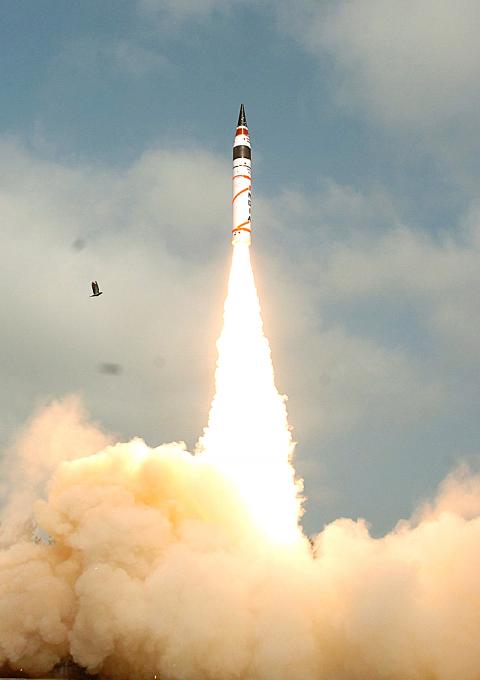India yesterday announced the successful test launch of a new nuclear-capable missile that would give it the ability to strike the major Chinese cities of Beijing and Shanghai, a significant step forward in its aspirations to become a regional and world power.
The Agni-V missile, with a range of 5,000km, still requires a battery of tests and must clear other bureaucratic hurdles before it can be inducted into India’s arsenal in a few years. However, officials hailed the launch as proof that India has taken its place among the world’s most powerful and scientifically advanced nations.
“The nation stands tall today,” Indian Defense Minister A.K. Antony said, according to the Press Trust of India.

Photo: EPA
China is far ahead of India in the missile race, with intercontinental ballistic missiles capable of reaching anywhere in India. Currently, the longest-range Indian missile, the Agni-III, has a range of 3,500km, which falls short of many major Chinese cities.
“At the moment there is a huge assymetry in China’s favor,” said C. Uday Bhaskar, former head of the Institute of Defense Studies and Analyses.
After it adds the missile to its arsenal, however, “India’s deterrent profile in the region would be appropriately burnished,” he said.
Video released by the government showed the Agni-V taking off from a small launcher on what appeared to be railroad tracks at 8:07am from Wheeler Island off India’s east coast. It rose on a pillar of flame, trailing billows of smoke behind, before arcing through the sky.
The missile hit an altitude of more than 600km, its three stages worked properly and its payload was deployed as planned, Defense Research and Development Organization head Vijay Saraswat told the Times Now news channel.
“India has emerged from this launch as a major missile power,” he said.
The missile will need four or five more trials before it can be inducted into India’s arsenal at some point in 2014 or 2015, Indian officials said.
Chinese Ministry of Foreign Affairs spokesman Liu Weimin (劉為民) declined to discuss the launch at a regular news conference yesterday, saying only that India and China should work together as strategic partners.
However, a state TV report on the launch enumerated the missile’s shortcomings and a Chinese newspaper warned India not to get arrogant and overestimate its strength.
“India should be clear that China’s nuclear power is stronger and more reliable. For the foreseeable future, India would stand no chance in an overall arms race with China,” said an editorial in the Global Times, which is published by the Chinese Communist Party’s official mouthpiece the People’s Daily.
China also said yesterday that upcoming joint war games with Russia were not organized in response to India’s successful ballistic missile launch and were instead aimed at upholding regional peace.
According to the Chinese defense ministry, the two neighbors will hold joint naval exercises in the Yellow Sea off the coast of the eastern port city of Qingdao from Sunday to Friday next week.
“This joint military exercise is a long scheduled one between China and Russia in order to uphold regional peace and stability,” Liu told reporters.

The CIA has a message for Chinese government officials worried about their place in Chinese President Xi Jinping’s (習近平) government: Come work with us. The agency released two Mandarin-language videos on social media on Thursday inviting disgruntled officials to contact the CIA. The recruitment videos posted on YouTube and X racked up more than 5 million views combined in their first day. The outreach comes as CIA Director John Ratcliffe has vowed to boost the agency’s use of intelligence from human sources and its focus on China, which has recently targeted US officials with its own espionage operations. The videos are “aimed at

STEADFAST FRIEND: The bills encourage increased Taiwan-US engagement and address China’s distortion of UN Resolution 2758 to isolate Taiwan internationally The Presidential Office yesterday thanked the US House of Representatives for unanimously passing two Taiwan-related bills highlighting its solid support for Taiwan’s democracy and global participation, and for deepening bilateral relations. One of the bills, the Taiwan Assurance Implementation Act, requires the US Department of State to periodically review its guidelines for engagement with Taiwan, and report to the US Congress on the guidelines and plans to lift self-imposed limitations on US-Taiwan engagement. The other bill is the Taiwan International Solidarity Act, which clarifies that UN Resolution 2758 does not address the issue of the representation of Taiwan or its people in

US Indo-Pacific Commander Admiral Samuel Paparo on Friday expressed concern over the rate at which China is diversifying its military exercises, the Financial Times (FT) reported on Saturday. “The rates of change on the depth and breadth of their exercises is the one non-linear effect that I’ve seen in the last year that wakes me up at night or keeps me up at night,” Paparo was quoted by FT as saying while attending the annual Sedona Forum at the McCain Institute in Arizona. Paparo also expressed concern over the speed with which China was expanding its military. While the US

SHIFT: Taiwan’s better-than-expected first-quarter GDP and signs of weakness in the US have driven global capital back to emerging markets, the central bank head said The central bank yesterday blamed market speculation for the steep rise in the local currency, and urged exporters and financial institutions to stay calm and stop panic sell-offs to avoid hurting their own profitability. The nation’s top monetary policymaker said that it would step in, if necessary, to maintain order and stability in the foreign exchange market. The remarks came as the NT dollar yesterday closed up NT$0.919 to NT$30.145 against the US dollar in Taipei trading, after rising as high as NT$29.59 in intraday trading. The local currency has surged 5.85 percent against the greenback over the past two sessions, central